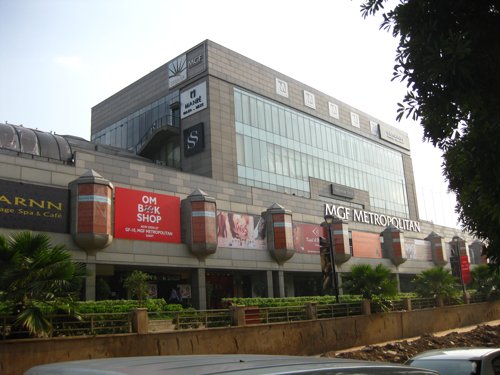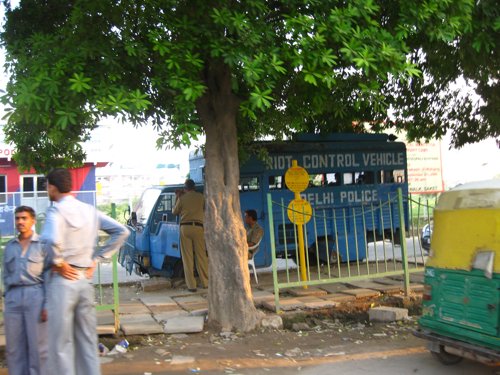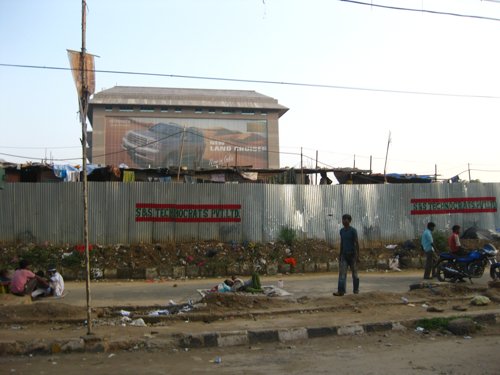One of the blogs I’ve been following lately is Hari Batti’s Green Light Dhaba which is very close to my heart. It seems that Hari talks about all things that I myself think about and I participate avidly in the discussions on his posts. And so I thought to myself, why not have a guest post from this great guy on my own blog? His is highly popular and my own poor creation gets some new readers as well pointing all my own subscribers and trespassers to a resource which is really going places. So I floated the idea to him, and he has kindly consented to spend his time and energy on a guest post for “Expressions”. Without further ado, here it is!
—————————————————————————–
It is a real pleasure to be guest posting here; I’ve enjoyed this blog a great deal since I found it a month or so back. I spend most of my time writing in Delhi at the Green Light Dhaba; I’d love to have you stop by there as well, some time.
Over the past few weeks, I’ve made fun of Delhi’s mega malls several times. That is because I think they are symbolic of much of what is wrong with India’s model of urban development. No matter how many basil plants Arjun Sharma, the director of Delhi’s Select City Mall, may have given away this Diwali, there is no escaping the fact that his mall is a disaster from an ecological and economic point of view.
I took my kids to the pair of monstrosities known as the Select City/MGF Metropolitan Malls and we did a little research a few weeks back. (And yes, I did have to compensate them with a round of over-priced iced teas. But I have never pretended to be perfect in matters of personal consumption.)

- MGF Metropolitan
Here are some of the things we found. First of all, the positive side: malls are designed to make people giddy with excitement! It happened to my kids; it even happened to me, just a little bit.
Where does this feeling come from? Some of it is a result of the fact that suddenly we are in a “market” where we don’t have to jump out of the way of speeding two wheelers. But there are other things malls do to make you feel that way. Look at all the lights; feel the AC; ah, the spray of the water from the fountains. Scarcity has no place in a Delhi mall; neither do really poor people.
It is an intoxicating illusion–if you don’t think too much about what it costs to create and maintain it. (On the way out, I had to wonder whether the bright blue “Riot Control” van permanently parked on the road in front of the mall was part of how that illusion is enforced.)

Of course, the good feeling does not feel so good once you see the price tags of the goods being sold.
You see, high end malls are…expensive! The week before Diwali, Mint ran a big spread on holiday gift ideas. It included things like a Boombox for Rs. 4,199, an iPod for Rs. 11,200, and playing cards in a crocodile skin holder for only Rs. 36,000. This is the kind of stuff you will find in a high-end Delhi mall, and it is terrible for a number of reasons. Aside from the obvious issues of bad taste and dead crocodiles, there is the fact that much of what you find in a mall is imported. From an environmental point of view, that means that a whole lot of stuff had to be shipped a very long way–and shipping is a major source of global CO2 emissions. From the point of view of old fashioned economics, there is another problem caused by all those imported goods: a large part of the money spent at the mall goes straight out of the country. Which means it does very little in terms of creating jobs here. By contrast, when you buy locally grown food or locally made products in your local market, nearly all of the money you spend stays right here in the local economy.
But what about all those workers the mall employs, you ask? In fact, a mall is a very inefficient employment generator, because very little of the money spent in the mall goes to the workers who work there. Of course Arjun Sharma is not going to let me go over his books, but we did speak to one worker who sells brand name handbags ranging from Rs. 1000 all the way up to Rs. 4,200. She earns Rs. 4,500 a month. In other words, one hand bag sells for nearly as much as she earns in a month. If there is a sale on, this woman may sell as much as Rs. 35,000 worth of product over the course of one day. Malls promote the growth of overseas factories along with a few low wage local jobs. We can do better than that.
Speaking of employment, it’s not as if the people who do the work of building these malls will ever be able to shop in them; in fact, they live in horrible slums. One of these tent cities occupied the land right outside Select City for years while it was being built. Now it has moved down the road closer to where some other projects are being developed. So as not to offend shoppers, it is hidden behind a tall fence.

After seeing this, my 9 year old asked me this: “Instead of building another mall, why don’t the workers build homes for themselves?”
I tried to explain about how people who invest money to build things want to make more money, and they think building a mall will give them more profits than building homes for poor people. “It’s how the game works, son,” I said.
“But it’s not a game. It’s life,” was his answer.
There wasn’t much I could say to that, of course, because he was right; life is not a game and to use such metaphors runs the risk of trivializing things that are not trivial: poverty, environmental degradation, enormous unfairness.
A new mall, like over-consumption in general, is possible and profitable because we don’t pay the full cost of products from the mine to the dump. It is profitable because the monthly wages of the woman who sells you a handbag may not be equal to the price of the handbag itself. It is profitable because we allow the men, women and children who build our malls and our roads and our homes to live outside under tarps.
It will not be easy to encourage investment in sustainable development. Investors won’t change their behavior out of the goodness of their hearts. Somehow, we need to change what is profitable. We can start by strengthening and enforcing minimum wage laws. Then we can see to it that companies are not allowed to pollute for free; the full cost (including the cost of pollution and disposal) of all products should be reflected in their price tags. That will make a lot of stuff, especially stuff that is designed for the dump, more expensive. If we do this, we will have to consume fewer material goods; if we do it right, we can compensate by consuming more things that are sustainable: art, leisure time, good food, clean water etc.
Figuring out how to make all this happen will be a complicated business, but it’s not impossible, and it’s terribly important that we start soon. We need to change the way we do business; to do this we’ll to change the rules of the game. The rules of life.
HB
@Baghwad: seem like I lost a comment–must have hit the wrong button. Or maybe it's being moderated. But if it somehow doubles up, you can cut this one! Nice job on the layout. It looks great. Thanks for giving me the platform.
@ Sajid, I wrote a longer reply that was lost in the ether. But you are right, of course: musing is not enough; nothing good will come without action by people who care about making the world better. On Gandhi Ji's birthday, I poked fun at people who think all we need to do is "blog for change".
On the other hand, action that is not informed by a lot of thought will not be so effective. That's why writing and thinking is part of the solution. I guess it's got to be a balance. Anyway, you know that; your project is clearly based on a lot of thought and hard work "on the ground." That's the key.
Glad you took the time to comment. Stop by the dhaba sometime.
HB
Hari/Bhagwad,
I do consider your thought process and with due regards, like to put across my views. Its time we believe in doing something rather than just musing over the issues that grips our country.
Now, let me retrospect. what am I doing or going to do? Dear friends, I am planning for a better healthcare facility for people in my hometown. Being in Emergency Healthcare Management project in my company, I have learnt many ways through which we can have a public-private partnership to uplift the downtroden.
My model, which isnt new, believe in the development of world class healthcare facilities for everyone who wants to avail them at very reasonable price (to those who can pay) and free to to those who cant. I am still growing this plan and shortly take the first step towards this.
My intention here is to solely put forth my ideas and ideology which says: believe in ‘Karma’. I cannot be a Mother Teresa, but I can of course bring difference in someone’s life.
Hari, you are doing a very good work and so does Bhagwad in his blog. I wish you both all the very best in your future endeavours.
Sajid
@Hari Batti
Ouch! Always a great pity when you lose a long comment – a piece of thought and prose vanishes :)
Trust me you. The benefit of having your guest post is all mine!
@Sajid
Why don’t you tell us more about your plans? Perhaps we can help. Some readers have experience that they might share with you and give you ideas or point out pitfalls. Give us the chance to do something worthwhile too!
@Hari:
Very nice to see that the dhaba now makes deliveries. Here in America we can only get cardboard-tasting pizza at home.
I hope you do not take offense because I remain your humble servant but I have a few points to make regarding your post:
Having spent some time in Southern California, in the United States, I can assure you that the Pink Mini-Mall which exists on nearly every corner is a monument to our capitalistic system and way of life. We love them.
You ignore the fact that crocodile skin is a completely natural, 100% biodegradable product. The carbon footprint it leaves is little bigger than the four claws of the dead reptile itself. I have many crocodile skins, including a fetching cape and matching tights with which I go out at night.
I think you should explain to your nine year-old that those people who build the malls could build housing after they got off work from mall-construction, but are simply too lazy. They need to take control of their lives!
Cheers.
Hari,
I agree with your concerns and I share them too.. But why is it that you single out the malls, isnt every other monument to the Capitalistic way of life is a threat to the environment as with the malls. Even if Malls didnt exist Crocodile Skins would still be sold as purses or bags or holders. If there wasnt a Mall there would have been a store which does the same. There is no enough argument here to single out what makes Malls monstrous or a disaster to the city's architecture.
This was something good I read along these lines some time back..
http://arieff.blogs.nytimes.com/2009/02/03/saving…
Again I appreciate your thoughts.. but would have expected a lot more solid arguments..
Excellent post. I don't think this is specific to malls per se – many other things don't reflect their true cost. For instance, many of the Made in China products we get at throwaway prices have a hidden cost of ecological damage in their home country. Partly, as consumers become more and more aware and start showing interest in the origin of products and not the price/status value alone, manufacturers will be forced to invest in better quality in the process too. However, some of it will need to be regulated – I don't think the market alone can do it, at least not at the pace which is needed.
Hari/Bhagwad,
Thanks for your reply. I am planning a big healthcare facility based on donations, charity, and voluntary service. I am planning to purchase an acre or more of land in my hometown so that I can start putting wings to my ideas. Still I am working on the project plan and as soon as I am done with one, will share with you all. I do believe that I will require your help down the lane in order to help needy secure good healthcare services.
Sajid
@Sakthi
Nice link btw. Good addition to my anti-suburban literary material :)
Well about link, you know, when recession started, there were so many such articles.. discussing about what happens when everyone leaves the sub urban spaces and all that.. And now that business is back to being profitable, all these have taken the back seat and life is back to being irresponsible..